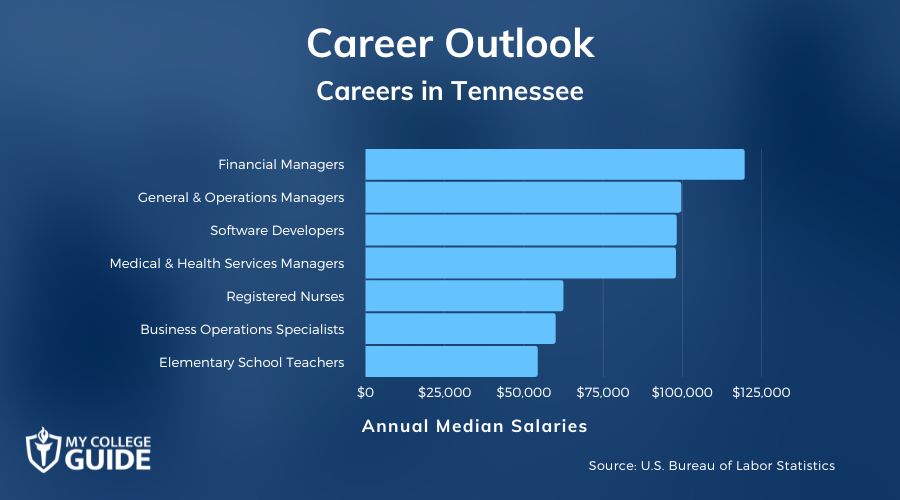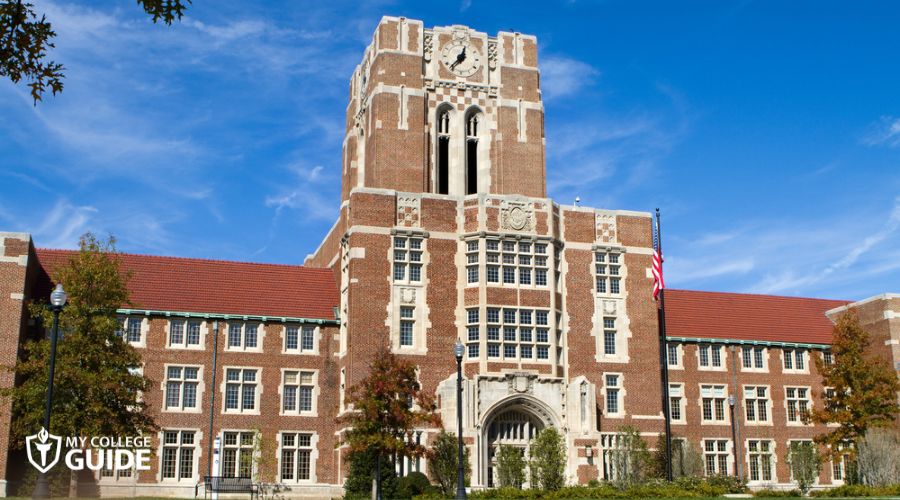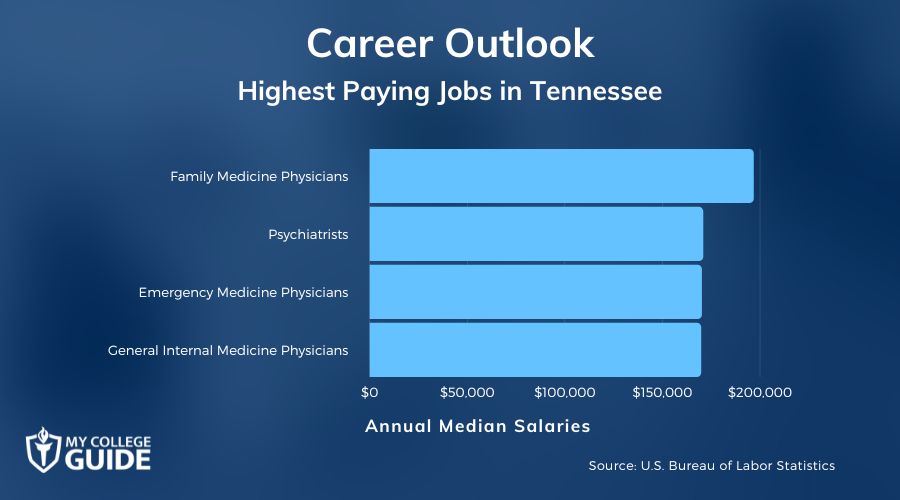More than just Bluegrass and barbecue, online colleges in Tennessee are helping the state make a name for itself in higher education.

The state’s initiative “Drive to 55” aims to increase the number of Tennesseans with an associate or bachelor’s degree to 55% by 2025. The goal is to expand college access and prepare students for the workforce, thereby improving economic development state-wide.
Editorial Listing ShortCode:
Tennessee’s dedication to education is also evident in its excellent catalog of colleges, outstanding online learning opportunities, and generous financial aid packages.
Online Colleges in Tennessee

Thanks to the increase of online degree programs in Tennessee, a report by the National Center for Education Statistics (NCES) states that 19.3% of college students in Tennessee were enrolled exclusively in online courses.
An additional 31.1% were participating in a hybrid of online and on-campus courses. These numbers have risen as schools have increased their online offerings. Various universities within the state offer more than 100 undergraduate and graduate online degrees in TN each. The courses are taught fully online, in areas such as business, health, humanities, and social science.
Editorial Listing ShortCode:
Students can consider online programs at the state’s private colleges as well. Some private institutions offer associate’s, bachelor’s programs, and even graduate programs, all online. Even small schools have online learning opportunities.
One of the best resources for online learning in Tennessee is TN eCampus, an easy-to-use portal that provides a comprehensive look at online college programs offered by 40 institutions across the state. In all, potential students can research and consider more than 500 online degree programs.
The option to attend online universities in Tennessee opens up the door to many students who may not be able to travel to Tennessee for education. It also gives you the ability to set your own schedule while maintaining your main responsibilities, such as a job or caretaker.
Common Online Degrees in Tennessee

There are many Tennessee online degrees available, and choosing the right one requires you to think about your skills and interests. Some of the most common degrees include:
- Nursing: Licensed and Registered Nurses earn nursing degrees to learn how to offer adequate patient care. The curriculum often includes courses in anatomy and physiology, pharmacology, and nursing informatics.
- Psychology: A psychology degree focuses on human behavior and mental health disorders. Many graduates of these programs go on to become therapists, counselors, and licensed psychologists.
- Business Administration and Management: During a business administration program, students learn leadership skills that are necessary to oversee an organization. These include areas like human resources, contract law, and finance.
- Criminal Justice: Students interested in careers as lawyers, police officers, or judges can benefit from a criminal justice degree. Coursework typically centers around ethics, effective communication, and police science.
- History: A degree program in history explores societies, cultures, governments, and arts in the past. Graduates of history degree programs may pursue careers as historians, high school teachers, and post-secondary teachers.
When you compare programs, consider not only what career you want to pursue but also what courses and subjects were most engaging to you in the past.
Overview of Higher Education in Tennessee

Tennessee is home to 82 degree-granting institutions, according to the NCES. Of those, 23 are public schools, 40 are non-profit private schools and 16 are for-profit private schools.
The NCES shows that tuition in the state is right in line with the national average, even when attending online universities in TN. In-state residents can expect to pay around $10,271 to attend one of the 4-year public institutions.
Out-of-state students will pay closer to $25,046. Tennesseans who are unable to find their degree at an in-state institution may benefit from a reciprocity agreement through the Southern Regional Education Board (SREB).
The SREB is a 16-state collaboration aimed at improving higher education. Through the SREB, residents of participating states may pursue degrees at schools in other participating states while paying in-state tuition.
Employment Outlook for College Graduates in Tennessee

Tennessee has a large and varied workforce with many growing industries. The Bureau of Labor Statistics reports that more than 2.9 million people work in the state. Many of them have positions in healthcare, management, and education.
The median annual salary for all occupations in Tennessee is $37,710, which is lower than the national median rate of $45,760 per year. The salaries for popular careers for college degree holders, including educators, managers, and nurses, are more competitive.
According to the Bureau of Labor Statistics, the Tennessee unemployment rate hovers around 3.5%, which is in line with the national average for the same time period.
Careers & Salaries in Tennessee

The job market in Tennessee offers opportunities to professionals in a variety of industries. A large number of employees in the state work in office and administrative support, transportation, sales, and production.
Positions in these industries often don’t require a college degree, but earning one may help you advance or negotiate a higher salary. For example, a retail salesperson in TN has a median annual wage of $25,900, while an operations manager earns $99,610.
Editorial Listing ShortCode:
Organizations in other fields, such as healthcare, education, and business operations, frequently look for job candidates with college degrees, and a degree is mandatory for many roles, such as teachers, nurses, and accountants.
According to the Bureau of Labor Statistics, these are among the most popular career paths for college graduates in Tennessee.
| Careers | Annual Median Salaries |
| Financial Managers | $119,620 |
| General and Operations Managers | $99,610 |
| Software Developers | $98,180 |
| Medical and Health Services Managers | $97,930 |
| Business Operations Specialists | $59,950 |
| Registered Nurses | $62,400 |
| Elementary School Teachers | $54,290 |
| Licensed Practical and Licensed Vocational Nurses | $49,970 |
| Human Resources Specialists | $49,230 |
| Bookkeeping, Accounting, and Auditing Clerks | $38,040 |
Earning a degree may also strengthen your resumé when applying to different types of employers. For instance, a degree in business administration may help you secure a position with a private business, government agency, nonprofit, or healthcare facility.
How to Know If an Online Degree is Right for Me

There are many advantages to online TN universities, but that doesn’t necessarily mean that it’s a good fit for everyone. Before making your decision, think about these factors:
- Technology skills and access: To take an online class, you’ll need a stable internet connection, a reliable computer, and the skills to navigate an online learning platform.
- Classroom engagement: Students in online classrooms connect with each other and their instructors through chat rooms, discussion boards, and live stream sessions, which may be challenging if you prefer face-to-face interactions.
- Study skills: Online learning requires strong time-management skills and self-motivation to ensure that students keep up with their work even though they don’t regularly see their instructors.
If you choose to enroll in an online college program, keep in mind that most schools offer resources, such as tutoring and office hours, to help you succeed.
Online Colleges in TN Admissions Requirements

All TN online universities have their own unique requirements for admission. Some of the most common criteria include:
- Transcripts: Submit official records from any previous academic institutions you have attended.
- Test scores: If required, turn in scores from standardized tests like the SAT or ACT.
- Recommendations: Ask former instructors and supervisors to write letters explaining why you’re a good fit for the program.
- Personal statement: Write a brief essay describing your past experiences and future goals.
Many colleges also require students to pay a fee and submit an application, and some have separate applications for particular programs.
Online TN Colleges Accreditation

Accreditation is a crucial consideration when researching different degree programs. Colleges and universities can apply for national or regional accreditation, both of which involve a thorough assessment and evaluation process. Because of the stringent standards of regional accrediting boards, a college with regional accreditation status is more likely to offer a high-quality academic program.
Editorial Listing ShortCode:
As a result, degrees from these schools are often regarded more favorably by employers. It’s also typically easier to transfer credits from a regionally accredited school. This is essential if you decide to change colleges midway through your program or plan to pursue an advanced degree.
Financial Aid and Scholarships

If you are interested in earning a college degree in Tennessee, you will first need to fill out the Free Application for Federal Student Aid (FAFSA). This will provide access to federal, state, and private financial aid.
The state of Tennessee offers a number of grant and scholarship programs to help make college more affordable. Here are just a few examples:
- Tennessee Student Assistance Award: This program is for students with an Expected Family Contribution (EFC) of $3500 or less. You must maintain satisfactory academic progress. The program awards $1,000-4,000 depending on the school.
- Wilder-Naifeh Technical Skills Grant: This program is for students enrolled at a Tennessee College of Applied Technology who maintain satisfactory academic progress.
- Tennessee HOPE Access Grant: This is intended for entering freshmen with a GPA of 2.75-2.99 and an ACT score of 18-20 or an SAT score of 960-1050.
- Tennessee HOPE Scholarship: This program is for entering freshmen with a GPA of 3.0 or higher and an ACT score of 21 or higher.
- Ned McWherter Scholars Program: This program is intended for high school seniors with a GPA of 3.5 or higher and an ACT score of 29 or higher.
You can also find assistance programs to help if you have been in the foster care system, in the military, if you plan to pursue teaching or nursing, and for many other circumstances. Students can also search for private scholarships, which may be awarded based on need, merit, intended major, or other unique factors.
Here are a few examples:
- Community Foundation of Greater Memphis Scholarships: Varies
- Jack Diller Education Award: (4) $2,500
- MaryEllen Locher Scholarship: Varies
It can also be a good idea to check with the financial aid office at the institution you have chosen. Many schools offer exclusive financial aid programs, and they can help you determine what you may qualify for and how to apply.
Tennessee Online Education Resources

It’s easy to feel overwhelmed when planning for college, but these online resources simplify the process:
- Tennessee Reconnect: This site helps returning, first-time, and veteran students learn about financial aid, degree programs, and the Tennessee Reconnect Grant.
- College for TN: Tools like the lifestyle calculator and career assessment allow students to determine the true cost of college and which programs are the best fit.
- TN eCampus: Students can search for online courses offered by community colleges and public colleges within Tennessee.
You can also reach out to the admissions and financial aid offices to learn more about your preferred college.
How Much Does It Cost to Go to an Online College in Tennessee?

The cost of TN online degrees depends on the specific type of program, the kind of college you attend, and your enrollment and residency status. In general, private universities are more expensive than public schools, and community colleges are often the most affordable option.
Editorial Listing ShortCode:
If you live in Tennessee, attending college may cost less than if you lived in another state. For example, an in-state student might pay $10,000 in tuition and fees, compared to $25,000 for an out-of-state student in the same program. Earning a degree online may also help you save money on parking, transportation, and other fees.
Tuition Breaks for Out-of-State Students

Although attending Tennessee online universities may be more expensive for out-of-state students, there are opportunities to receive a lower tuition rate.
Tennessee is part of the Southern Regional Education Board, which includes the Academic Common Market. Under this program, a nonresident student can pay the in-state tuition rate at a participating Tennessee college as long as the program isn’t offered within their home state.
The 16 participating states in this agreement are Tennessee, Alabama, Arkansas, Delaware, Florida, Georgia, Kentucky, Louisiana, Maryland, Mississippi, North Carolina, Oklahoma, South Carolina, Texas, Virginia, and West Virginia.
Some of the best universities in TN have opted to eliminate out-of-state tuition entirely, particularly for online students. These schools offer a flat tuition rate for all students regardless of residency, but they may charge an extra fee for students taking virtual classes.
What Jobs Are in High Demand in Tennessee?

A college degree may strengthen your candidacy for a job that’s currently in demand by employers. Joining an expanding field may help you get a job more quickly after graduating and offer greater stability throughout your career.
According to the Tennessee Department of Labor and Workforce Development, these areas of employment will experience significant growth over the next several years and offer job opportunities for college graduates:
- Office and administrative support
- Management
- Healthcare practitioners
- Educational instruction and libraries
- Business and financial operations
Students with degrees in subjects like nursing, education, and business are well-suited to roles in these industries.
What Are the Highest Paying Jobs in Tennessee?

When choosing a career path, potential earnings are usually a significant factor. According to the Bureau of Labor Statistics, family medicine physicians have the highest pay in Tennessee, with median annual wages of $196,580.
Other jobs in the medical field have similarly competitive wages. Psychiatrists have median salaries of $170,730 per year, emergency medicine physicians make $170,020, and general internal medicine physicians earn $169,670.
Editorial Listing ShortCode:
It’s important to remember that a job title does not guarantee that you will earn a substantial salary. Your wages ultimately depend on multiple factors, including your specific location, type of employer, and years of experience.
List of Online Colleges in Tennessee
Methodology: The following school list is in alphabetical order. To be included, a college or university must be regionally accredited and offer degree programs online or in a hybrid format.

Austin Peay State University offers online programs for both undergraduate and graduate degrees as well as certificates. Potential programs include computer science, criminal justice, management, marketing, and sociology. Courses typically follow a semester schedule and are often offered in the fall, spring, and summer.
Austin Peay State University is accredited by the Southern Association of Colleges and Schools Commission on Colleges.

Bethel University offers online programs for associate’s, bachelor’s, and master’s degrees. Some programs may require short, in-person intensives. Potential programs include criminal justice, business management, human resource management, and nursing. Bethel also offers a global studies program, with the aim of providing an opportunity to study abroad.
Bethel University is accredited by the Southern Association of Colleges and Schools Commission on Colleges.

Bryan College offers online degree programs for undergraduate and graduate degrees, along with professional certificates. Popular programs include business administration, communication, interdisciplinary studies, and public administration.
Courses typically follow a semester schedule. Access to online tutoring services and an academic advisor are commonly offered, and financial aid may be available for qualified applicants.
Bryan College is accredited by the Southern Association of Colleges and Schools Commission on Colleges.

Carson-Newman University offers degree programs fully online with courses usually taught in an asynchronous format. Both undergraduate and graduate degrees are offered. Typical programs include areas in education, professional studies, and nursing practice. Courses tend to follow a 16 week schedule with start dates commonly offered in the fall, spring, and summer.
Carson-Newman University is accredited by the Southern Association of Colleges and Schools Commission on Colleges.

East Tennessee State University offers online programs for bachelor’s and master’s degrees and for professional certificates. Potential programs include allied health, English, human services, social work, and marketing. Courses are typically taught in 5 or 7 week formats or follow a regular semester schedule.
ETSU is accredited by the Southern Association of Colleges and Schools Commission on Colleges.

Johnson University–Knoxville offers online degree programs in a Christian-based environment. Potential programs include applied linguistics, intercultural commerce, ministry leadership, psychology, and visual media design. Courses tend to be 7 weeks long, and there are often 6 start dates offered throughout the year. Up to 75 percent of many program’s required credits may be transferred in.
Johnson University – Knoxville is accredited by the Southern Association of Colleges and Schools Commission on Colleges.

King University offers online undergraduate and graduate degree programs with courses taught primarily in an asynchronous format. Potential programs include English, accounting, information technology, social work and psychology. Courses are typically taught in an accelerated format, and there are commonly 9 start dates. Some degree programs may be completed in as little as 16 months.
King University is accredited by the Southern Association of Colleges and Schools Commission on Colleges.

Lincoln Memorial University offers a selection of online degree programs fully online and some with the option of taking hybrid courses. Potential programs include a bachelor’s in nursing or a master’s or doctorate in fields like public administration, medical science, and veterinary education. Courses tend to follow a semester schedule.
Lincoln Memorial University is accredited by the Southern Association of Colleges and Schools Commission on Colleges.

Lipscomb University offers online degree programs in a faith-based environment, including an associate’s through master’s degree. Lipscomb also offers graduate certificates. Popular programs include data analytics, entertainment management, public administration and sustainability. Credit may be granted for prior learning experiences. Courses are typically offered twice per semester in an accelerated format.
Lipscomb University is accredited by the Southern Association of Colleges and Schools Commission on Colleges.

Middle Tennessee State University offers several online degree programs at both the undergraduate and graduate levels. Potential programs include commerce, communication literacy, political science and aeronautical science. Courses may be taught in either a synchronous or an asynchronous format. Courses are commonly offered over either a full semester or in a half-semester accelerated format.
Middle Tennessee State University is accredited by the Southern Association of Colleges and Schools Commission on Colleges.

Tennessee State University offers fully online programs leading to both undergraduate and graduate degrees. Potential programs include psychology, urban studies, higher education leadership, and holistic nursing. Fall and spring courses tend to follow a semester schedule, whereas summer courses are often 5 or 10 weeks long.
Tennessee State University is accredited by the Southern Association of Colleges and Schools Commission on Colleges.

Tennessee Tech University offers a select number of graduate degree programs online. Potential programs include accounting. exercise science, health information management, and urban studies. Most programs require the completion of 30 credit hours, and degrees must be finished within 6 years. Courses tend to follow a semester schedule and have 2 terms offered during summer.
Tennessee Tech University is accredited by the Southern Association of Colleges and Schools Commission on Colleges.

Trevecca Nazarene University offers associate’s through doctoral degree programs online but with some programs offering on-campus course options. Potential programs include business management, Christian ministry, African American worship studies, and clinical counseling. Courses typically follow a semester schedule with start dates commonly offered in the fall, spring, and summer.
Trevecca Nazarene University is accredited by the Southern Association of Colleges and Schools Commission on Colleges.

Union University offers bachelor’s, master’s, and doctoral degree programs online and in an academically rigorous Christian environment. Potential programs include RN to BSN, Christian leadership, education, music technology, and business administration. Courses are commonly 8 or 16 weeks long.
Union University is accredited by the Southern Association of Colleges and Schools Commission on Colleges.

The University of Memphis offers over 100 online degree programs through its Global learning system, including both undergraduate and graduate degrees. Programs are typically offered in arts, business, computing, education, engineering, and the humanities.
Credits for prior learning may be granted. U.S. News & World Report ranked the University of Memphis among the best schools in the country for online bachelor’s degrees.
The University of Memphis is accredited by the Southern Association of Colleges and Schools Commission on Colleges.

The University of Tennessee–Chattanooga’s Distance Education system offers undergraduate and graduate degree programs either fully online or in a hybrid format. Popular programs include computer science, psychology, and criminal justice. Courses tend to follow a semester schedule with start dates commonly offered in the fall, spring, and summer.
The University of Tennessee at Chattanooga is accredited by the Southern Association of Colleges and Schools Commission on Colleges.

The University of Tennessee–Knoxville offers over 70 online programs, including for bachelor’s, master’s, and doctoral degrees. Programs are commonly offered in agriculture, arts, nursing, business administration, and health and human services. Courses may be taught in both synchronous and asynchronous formats and tend to follow a semester schedule with fall, spring, and summer start dates.
The University of Tennessee – Knoxville is accredited by the Southern Association of Colleges and Schools Commission on Colleges.

The University of Tennessee–Martin offers online degree programs in areas such as agricultural business, forensics, history, law enforcement, management information systems, and nursing. Courses tend to follow a regular semester schedule with common start dates in the fall, spring, and summer. Tennessee residents may qualify for the UT Promise undergraduate scholarship program.
The University of Tennessee at Martin is accredited by the Southern Association of Colleges and Schools Commission on Colleges.

Vanderbilt University offers a limited number of online master’s and doctoral programs primarily online. Potential programs include engineering management, nursing, and leadership and learning in organizations. Programs are offered through their respective schools, so admission and graduation requirements may vary. Many courses are offered in a block format.
Vanderbilt University is accredited by the Southern Association of Colleges and Schools Commission on Colleges.

Welch College offers online programs leading to an associate’s degree or an option to finish a bachelor’s degree. Potential programs include Biblical and ministry studies, business, arts and general Christian ministry. The school traditionally provides learning based in the Christian faith. Courses tend to follow a semester schedule. Credits earned at other accredited institutions may be transferred into some programs at Welch.
Welch College is accredited by the Southern Association of Colleges and Schools Commission on Colleges.
Getting Your Online Degree in Tennessee

Tennessee is a state that values postsecondary education, and it shows. With nearly a hundred well-respected colleges and universities, plenty of online programs, and more financial aid programs than many other states, it’s a great idea to get your degree in Tennessee.
If you’re ready to take the next step in your higher education journey, consider researching accredited Tennessee online colleges that offer your chosen degree program.
You can also view our Online Colleges in South Dakota and Online Colleges in Texas guides for more options.
